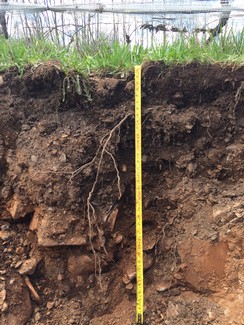L'Acadie Vineyards Blog
Welcome to the L'Acadie Vineyards blog and winery news
Update from the Vineyard
Climate change continues to impact wine regions across Canada, more recently in British Columbia’s Okanagan Valley with record January lows of -28C wiping out possibilities of any crop this year. Nova Scotia had a comparatively less severe polar vortex in February 2023 and the main difference in impact is due to BC’s plantings of sensitive vinifera grape varieties compared to our region’s predominantly hybrid varieties. At least we had crop from L’Acadie Blanc and Leon Millot last year, reasonable yields from our certified organic and biocyclic vegan Gaspereau vineyard, but young vinifera Chardonnay and Pinot Noir got hit hard and vineyard practice has to be focused on renewal for future years by carefully training new trunks.
Read CBC article Cold snap causes catastrophic loss for BC's wine industry
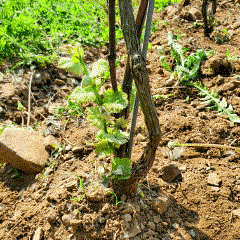
Chardonnay new shoots in May 2023 after polar vortex: L'Acadie Vineyards
Happy to report that we don’t expect any winter damage this year after a fairly mild January and February. It’s still early to clink glasses together and we’ll wait until threats of late spring frosts are over – a spring frost/freeze in 2018 impacted our inventories of aged sparkling wine. The vines do not need another year of stress and we continue to inspect for signs of damaged trunks from the polar vortex.
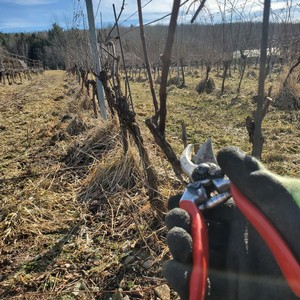
Pruning started on Leon Millot and L’Acadie Blanc and we are leaving 3-4 fruiting canes - one as a kicker cane to delay budbreak, to be removed after spring frosts are over. Chardonnay and Pinot Noir and our coveted little planting of Sauvignon Blanc will need minimal pruning as we train new shoots/trunks... and possibly get a very small crop this year. Perhaps we’ll toast with a glass of our upcoming new first release of 2021 Sauvignon Blanc traditional method sparkling!
Read a related blog, Climate change and organic farming
Climate change resilience and organic farming
We have long been supporters of Atlantic Canada Organic Regional Network ACORN, and they have good information on their website - a small excerpt shared below.
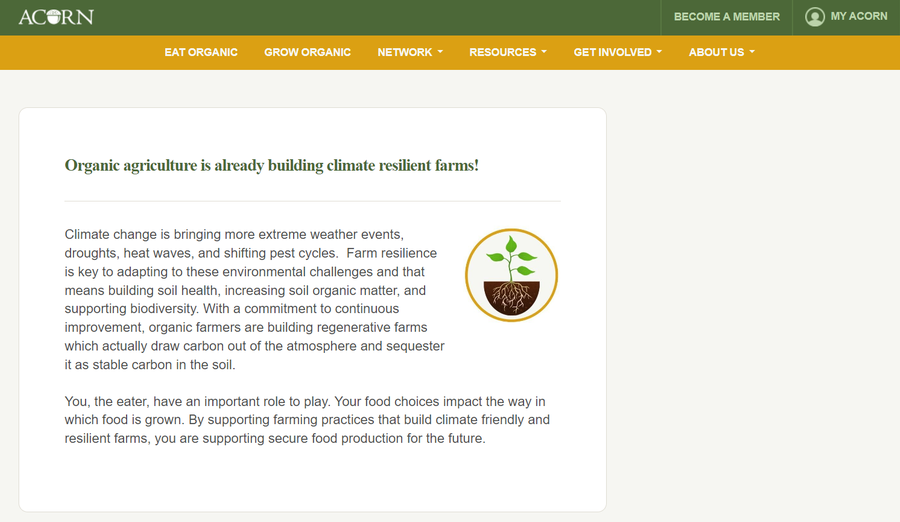
Climate change affects vineyards with extreme events such as severe winter damage to vines in British Columbia for the past two years, polar vortex in Nova Scotia last year with similar damage, and droughts in other wine regions of the world. Organic farming builds resilience AND contributes to a solution, as ACORN describes so well.
A couple notes about our organic and vegan practices:
- living soils - symbiotic fungi expand root zone influence by 2-10x for more water and nutrient availability, read more
- regenerative agriculture - cover crops between vineyard rows create biodiversity and pull carbon from the atmosphere and store it in soil, watch video about our cover crops
- livestock greenhouse gas generation - we are certified Biocyclic Vegan, no animal products from soil to glass, read more
Year in review 2023
Year in Review - 2023 curveballs
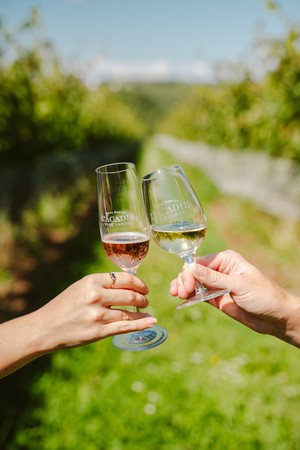
Mother Nature threw many curve balls at us this year. We are thankful on many fronts and perhaps most promising are the early indicators of resilience from farming our Gaspereau vineyard organically.
The polar vortex in February reduced our viable buds and we adjusted our pruning and other cultural practices. L'Acadie Blanc and Leon Millot had reasonable yields but not so with Chardonnay, Pinot Noir and Sauvignon Blanc. Hopefully new trunks that we carefully nurtured this year will give us good growth next year in these vinifera blocks. There was some vine loss with these more cold sensitive varieties but not nearly as much as we anticipated and perhaps attributed to deep reaching roots in our gravelly soil coupled with living organic soils rewarding us with a measure of early resilience in these young blocks.
Read our blog about climate change resilience from living soils
Then the rains came. The resulting high mildew pressures were very risky all summer and our organic viticulture was put to the test! Happy to say that we avoided significant diseases with the great work from our new vineyard supervisor, Chris.
See video of Chris explaining our organic and vegan vineyard practices,
Harvest started September 21 and we couldn't have been happier with finally getting dry, warm, shorts and t-shirt weather. And good timing for flavour development too! Everything was hand picked and whole cluster pressed with a gentle sparkling press program for best quality juice. The only exception to this daily routine was L’Acadie blanc fermented on its skins for our next release of Orange Wine coming from our Gaspereau winery in the spring.
The iconic signature in Nova Scotia didn't waver even with all the curveballs - consistent ripe grapes with great acidity and moderate sugar levels. We see it every year, no compromises, and it is this significant attribute of our cool climate that constantly validates our emerging sparkling wine region. Look for structured, lower alcohol and refreshing sparklings in future releases, and a dry crisp whites in the spring!
We earned many wine awards this year with Prestige Brut Estate and Vintage Cuvee leading our portfolio with golds from Decanter World Wine Awards and National Wine Awards of Canada, respectively. Very thankful for media attention and accolades for the first Decanter gold ever for Nova Scotia, throwing a spotlight on organic vegan wine quality.
Read our blog about Gold at Decanter World Wine Awards and Decanter's article Canada Calling: The wines exciting the experts now
Winter solstice resets our thoughts to reflect and calm as we plan the new season, the new cycle of life, for our 20th year. Very grateful.
~Bruce, owner winemaker
Sustainable Wine - how far have we come?
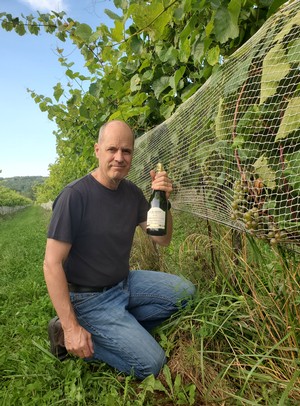
How far have we come? Sustainable wine may sound like a buzzword created by corporate wine executives to sell more wine and give impressions that all wineries must already subscribe to the concept because it's repeated in marketing so much and seems attainable but there remains a large gap between wine producers. You’d think the wine industry would have progressed the most since the beginnings of the environmental movement in the 1960’s, their marketing is so visible, seductive and competitive. But like climate change, microplastics and bee colony collapse there continue to be issues that our society has been slow to understand and act on. Why aren’t we more advanced? The alarm sounding, environmental catalyst classic Silent Spring by Rachel Carson was published in 1961 and the culture at the time was that synthetic insecticides will save the world. Her dystopian outlook for the environment affected by these persistent chemicals such as DDT threatened that culture and she was attacked and muffled by stakeholders and the misinformed. Scenarios repeated time and time again for the last 60 years.
Wine, the beverage of ingredients. If mother nature doesn't provide during the growing season, well there’s an ingredient for that. And the range is great – Mega Purple for colour, potassium sorbate for stability, crushed chestnuts for more tannin, gelatin for less tannin, citric and tartaric acids for more acidity, potassium bicarbonate for less acidity, even ethanol for more alcohol, and water for less alcohol. There are animal inputs like egg whites, gelatin, milk protein, and synthetic inputs like PVPP (plastic) and a broad range of synthetic pesticides. I introduce vineyard inputs here because whatever is added to the vineyard ends up in your glass as residual chemicals. Similar to Silent Spring’s explanation of the relationship of aerial spraying DDT on Elm trees and the residue on leaves killing robins via earthworms. Many pesticides are systemic, they protect the vine from within by being absorbed into tissues, vascular system and berries, and even contact pesticides are absorbed into the plant, like our skin absorbs. Most provincial liquor boards require a pesticide residue analysis before listing a wine because there are limits set. Limits that are recognized to be safe doses, not carcinogenic. But pause here and think about the last 60 years and how we seem to have learned so little. The World Health Organization (WHO) classified Roundup, a too common glyphosate weed killer used in vineyards, as probable carcinogen but changed it to possible carcinogen in the 80's after chemical industry lobby pressures. It is now back to probable carcinogen.
Read Organic diets quickly reduce the amount of glyphosate in people's bodies
Raise your hand if you are interested in sustainability. In protecting our precious environment and your health, and your community’s health. Brock University recently conducted wine research: An Exploration of Consumer Perceptions of Sustainable Wine. Over 700 people surveyed.
“Consumers with high involvement in sustainable wines tend to be younger, better educated, more involved in wine in general, and spend more per bottle than those with low involvement.” Pickering, Best, 2023
“Results show that sustainability-related cues are somewhat valued by consumers when making purchase decisions, but have low importance relative to the other cues examined. Environmental dimensions of sustainability have high saliency, in contrast with social and economic dimensions, and a significant minority of respondents report no or very limited knowledge of sustainable wines.”
There is change happening and it is generational – millennials and Gen Z are leading consumers. In Europe the changes are most apparent. Spain’s Denomination of Origin Penedès in Catalunya (DO Penedès) recently announced an extensive roadmap up to 2030, taking into account sustainability and establishing the region as a high-quality wine producer in Spain. Most immediately, all grapes for DO Penedès wines must be from fully-certified organic vineyards by 2025.
Full article: DO Penedes Organic Wine Plans by Decanter
European government funding for vineyards is based on level of sustainability, with certified organic being king. And as noted, quality is a large motivator for this Spanish region. Climate change resilience is a benefit too with cover crops, diversity and minimal tillage protecting the soil.
The organic approach is only natural inputs into grape growing and winemaking with every step monitored for traceability and transparency by rigorous third party inspections. Biodiversity of cover crops between rows create habitats for predatory insects such as parasitic wasps and dragonflies and protects the surface of the soil so that soil fungi and earthworms can cycle nutrients to roots which helps sequester carbon in a uniquely living regenerative agriculture system. Living soils are the goal of organics and nurturing it with composted grape pomace teeming with fungi extends vine root zone influence by as much as 10 times with symbiotic fungal filament networks. Vegan viticulture excludes animal manures that can lessen living soils and cause pollution of underground water systems. Vegan certified producers extend this concept to winemaking with no animal inputs. A common ingredient is gelatin and this is made from slaughthouse waste. Other ingredients not allowed in organic winemaking include synthetic preservatives, irradiated and genetically modified ingredients.
I’m in! How to find organic wines. Read labels and find organic vegan wines here! In Canada, only organic wines from soil to glass can bear the Canada Organic logo on the label. Wines that are made from organic grapes but not organic winemaking can not have the organic logo because the treatment of the wine after growing is unknown, and the integrity of chain of custody of grapes that went into bottles is equally unknown. Certification to the Biocyclic Vegan Agriculture standard, based in Europe, ensures wines have no animal inputs from soil to glass. This has far reaching benefits to climate change mitigation and animal welfare.

Discovering Rocks
Discovering Rocks
Our journey to find our unique terroir started when were still living in BC’s Okanagan Valley. Vacations to visit family in Nova Scotia always included visiting local wineries such as Domaine de Grand Pre and enjoying their delicious L’Acadie Blanc still wines - beautiful dry fruity wines with balanced crisp acidity that reminded me of the ideal structure for sparkling base wines that I pursued in Okanagan and sometimes failed to find. These wines were grown on typical heavy soils with loamy clay on south slopes and today I believe fruit expression from those sites is partially from soil water holding capacity and vigour. We were looking for a property to grow Nova Scotia’s first sparkling wine, so sipping wine and discussing soils late into the night centred on sparkling and where for OUR L’Acadie Blanc. I had experienced the effects of site and soil on wine characteristics in my BC career many times, a good example is Pinot Noir made from sandy soils of the hot Black Sage Bench sub-appellation compared to the more luscious juicy Pinot Noir from heavier soils and cooler days in adjacent Similkameen Valley, and I also understood the importance of harmony in a sparkling base wine – the balance between fruit expression and bottle aging toastiness. Guiding all of our discussions was a conviction to do it organically, for better flavours like I had seen winemaking at Summerhill Pyramid Winery, and for our family and neighbours' health.
We found our 30 acres of Gaspereau paradise online in BC. It was listed as a tourist accommodation business, hobby horse farm and residence, and the horse pasture caught our eye for grapes with thankfully no interventions on the land for years and protected from conventional agriculture with robust buffers. Many investigations later revealed rocky well-drained soil on a bench sloping 5% northwest, a uniquely different aspect and soil than the vineyards on other side of Gaspereau Valley and counter to the manta of the time “need south slope, need south slope”. Bubbling up from mixed local wine grower opinions was the long-standing history of good producing apple trees by the Duncanson family 50-100 years ago and our knowledge of matching soil, varietal and wine style. We took a chance that the terroir would give us the sparklings that we envisioned.
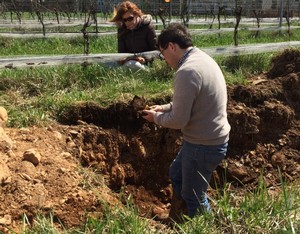
Next year marks 20 years and our decision to plant organic L’Acadie Blanc on these soils has been validated with numerous international sparkling awards. It hasn’t been easy for the vines as they slowly stretched their roots straight down deep through schist, sandstone, slate and gravels. Now they are strongly rooted with symbiotic networks of fungal filaments that further their reach for nutrients, making them more resilient to climate change and, more immediately apparent, sourcing and expressing their terroir very clearly. Wine judges have been noticing our flavours especially in organic wine Prestige Brut Estate sourced from a block that has more topsoil and more vigour.
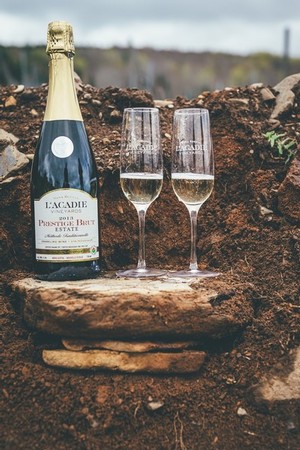
“Open and powerful nose with grilled hazelnut, pineapple, lemon and honey” 2010 PBE, Effervescent du Monde, silver
"A floral, apple nose with chalky lemon and creamy pear on the refreshing, mineral palate." 2013 PBE, Decanter, 92 points
"Complex apple, peach, nut and citrus bouquet with a toasty palate and fine mousse" 2014 PBE, Decanter, 92 points
"Perfumed with rose, white peach and toast; and a bright palate of zesty lime zest and apple." 2015 PBE, Decanter, 88 points
"Pretty and attractive, with white fruit, honey melon, chalky green apple and lifted floral aromatics lead through to a palate of vibrant acidity, citrus curd and a fine, saline finish." 2017 PBE, Decanter, 95 points
Minerality and more focused terms such as electricity, vibrancy and zesty can be used to describe our terroir and as well as an underlying descriptor of slight saline related to ancient seabed origins of our mainly sedimentary rocks. We continue to build the soil and rhizosphere with vegan viticulture inputs of composted grape pomace teeming with organisms and humus to nurture topsoil and below. This topsoil on top of rocky profiles is analogous to Champagne’s Grand Cru parcels with their topsoil over chalky soil and provides a living window to the surface contributing crucial elements such as atmospheric nitrogen fixed by clover and other plants in our cover crops.
To say we are excited about the future gifts our vineyard will yield is an understatement. Roots will get deeper and source more flavours, and we have expanded the estate to include new plantings of Chardonnay, Pinot Noir and Sauvignon Blanc.
Hybrid vs. vinifera - let's market our region instead
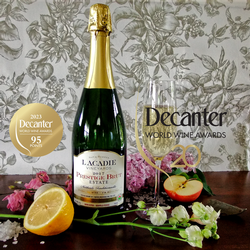
Our wine region is based on hybrid grapes, grape varieties originating from plant breeding programs that blended the winemaking characteristics of European varieties called vinifera with North American varieties known for winter hardiness and disease resistance. An example of vinifera is Chardonnay and a local hybrid is L’Acadie Blanc, Nova Scotia’s signature grape variety. Many hybrid varieties were pulled out in other warmer regions of Canada in the 1980’s and replanted with vinifera, almost all grapes in BC and less in Ontario, and they were known for high cropping and a quality level that suited consumer preferences of the day – I was in BC at this time in my early winemaking career making Hochtaler and Baby Duck. Myth and stigma continues for hybrid grapes but wines in cool climates like our region are high quality from excellent viticulture and turning heads, and we have to learn to market them without making excuses.
L'Acadie Vineyards recently earned a Gold medal and 95 points at Decanter World Wine Awards in London for a 100% L’Acadie Blanc sparkling wine called Prestige Brut Estate. It has been three months since the announcement and our Gaspereau winery is having an enjoyable ride of media coverage and sales. In our favour are competitions such as this prestigious one where the sparkling cartegory is not varietal specific, and tasted blind. After a period of reflection my opinion is that Decanter’s take on the win is similar to when a California wine first won at this prestigious European wine competition in the 1970's, dramatized in the film Bottle Shock. Very much appreciate their words about us, but the focus is tilted towards hybrids,
"Canada is a cool climate region that knows a thing or two about the benefits of hybrid grape varieties, and for the first time a single varietal L’Acadie Blanc, a hybrid crossing of Cascade and Seyve-Villard, was awarded a Gold medal in its rendition as a sparkling wine for L’Acadie Vineyards, Prestige Brut 2017 from Gaspereau Valley in Nova Scotia. A noteworthy first-ever Gold for the region too." Olivia Mason, Decanter June 7, 2023.
They focussed on the "shock" of a hybrid grape winning but isn’t the real news, the “bottle shock”, that Nova Scotia won? Or our winery, our organic wine. It's feeding the myth that hybrids are lesser quality but with notable exceptions like this one bubbling up from the bottom now and then. If a wine from Portugal’s Douro Valley appellation won a similar award would the news be about a relatively obscure regional varietal like Gouveio, Malvasia Fina, Rabigato, and Viosinho or would it simply be the Douro region? I think the latter and much better for marketing the region especially since they rarely label their wines by varietal. And what if a Tidal Bay wine won a big international award? Would the focus be on the hybrid varieties in the blend? Much better marketing for our region would be to promote the appellation brand and Nova Scotia.
How do we change the narrative? Let’s start close to home. I have heard it so many times from wineries in Nova Scotia,
“we have the hybrids pruned and now starting the viniferas”
“how much do you pay for hybrids?”
And more recently, “congratulations on your Decanter gold, especially since it is for a hybrid”
Let’s start talking about varieties as just that, varieties, without categorizing them into a class system. Each variety has unique winter hardiness and disease resistance and we even saw an exception to the myth rule this past winter after the polar vortex - Riesling fared better than hybrid New York Muscat.
There has been much effort to plant vinifera varieties in the last 10 years under the impression that wine trade will take our region more seriously if we produce varietals such as Pinot Noir and Chardonnay. The polar vortex was a sobering call and perhaps it’s time to change our mindset, and change wine trade’s narrative. And there are individuals in wine trade that are already our “freedom riders”,
“I’d rather have a ripe Marechal Foch than an underripe Pinot Noir”, well known local wine lover Jeff Pinhey
"I used to turn my nose up (literally) at North American hybrid grapes as a young and foolish sommelier. Now, I'm putting my money where my mouth is! #lovelacadieblanc !", Kristen Perrin, sommelier
Is your wine organic or certified organic?
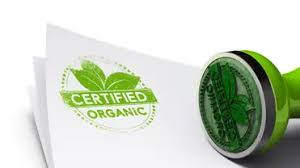
If you look at our website you’ll notice that we use the term “organic” often, and only when we reference our certifying body do we say “certified organic by Pro-Cert”. We can say “organic”, and we do many times because all of our wines are organic, but we can not say “certified organic” by itself, according to the current Canada Organic standard. We disagree with this requirement.
Canadian Food Inspection Agency (CFIA) regulates the Canada Organic standard and have a draconian regulation that restricts organic operations like our winery to not use the term “certified organic” unless we say who we are certified by. I’m even inviting an official non-compliance letter from them for writing this blog with that term. Why do they have this regulation? They argue that it sounds like a higher level of organic status compared to someone claiming organic. And here is where it gets even more unfair – a non-organic operation can claim organic on their website and other marketing media as long as not where their product is sold. Here’s an example of a website for an imaginary conventional winery not making organic wine: “We follow organic practices in our grapegrowing to make quality wine. Buy our wine here”. They don’t sell grapes, so no offence there. They sell wine, but are not claiming that the wine is organic, so no offence there either.
We need changes at the five year review of the Canada Organic standard this year so that we and other organic producers can use the term “certified organic”. We are certified, not merely making a general claim, and deserve to use the term to stand out in a crowded and noisy marketplace. We spend many dollars every year to have rigorous inspections, traceability audits and mass balance audits all to prove to CFIA that we follow the organic standard. Organic operations in United States are allowed to use the term. It’s time to update the Canada Organic standard so we can use it as well.
Read more about the benefits of choosing organic wine,
Transparency and Sustainability:the benefits of choosing organic and vegan wine
Fungus for climate change resilience
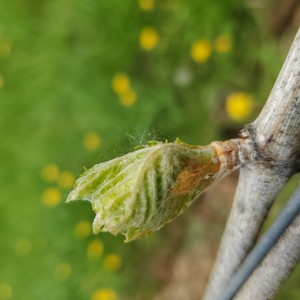
The world of fungi is amazing. I always credit kombucha’s yeasty cloudy popularity to wine lovers’ rapid acceptance to similarly cloudy Petillant Naturel wines. And Hollywood’s portrayal of “mind-controlling” fungus in Last of Us has further vaulted fungus to rock star status, a sinister version in this case. Another fungus, a beneficial one, called mycorrhiza lives in soil and has a critical symbiotic relationship with roots to help vines access water and nutrients especially during drought and other extremes from climate change. This is a true rock star.
When plants made that difficult evolutionary step from a nutrient-rich marine environment to a relatively harsh soil home, they had to make an alliance with microbes in the soil to survive. Mycorrhizal fungi grows into root cells to access carbohydrates from the vine, and in exchange, root zone influence of the vine expands to 3-10 times with a complex network of fungus filaments. I call this microbial terroir. Water, nutrients and “flavours” in soil are more accessible for the vine.
Organic practices at our Gaspereau vineyard encourage this living soil, rather than the conventional approach of ignoring microbes and following a regime of feeding vines directly with readably accessible synthetic fertilizers. The microbes seem to know – decreasing their relationship with the roots, almost sensing that they are not needed to cycle nutrients for the vine. Same outcome with animal manures. Other practices that kill fungi are tilling excessively between vineyard rows rather than using a constant cover crop and using herbicides like glyphosate (Roundup). We make plant-based compost teas, a veganic approach, to inoculate vines with beneficial fungi – crowding out disease organisms on leaves and further enhancing soil and roots. It's why we are Biocyclic Vegan
Strengthening our microbial terroir helps our vines be more resilient to climate change. Accessibility to nutrients and water is enhanced and that's especially important with extreme weather events.
Here's an article about research in Portugal,
The microbes that could protect grapevines from climate change
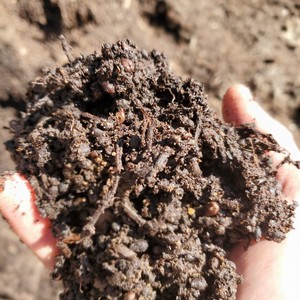
Budbreak 2023

On February 4, 2023 temperatures dropped to -25C in the Annapolis Valley, a polar vortex event in an otherwise mild winter. See CBC news video
We knew that our Gaspereau vineyard would be impacted and the effects are starting to show as we proceed through budbreak. We pruned lightly and left more canes for growth and are seeing a reasonable budbreak so far. The above image is Leon Millot. Even though there are shoots emerging we stll don't know how much crop we will get for 2023...and expect it to be less. Same for L'Acadie blanc.
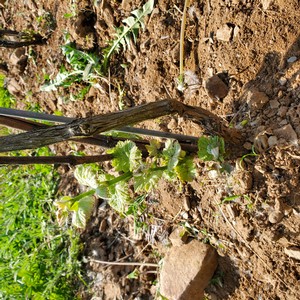
The next image is Chardonnay that is only showing shoots at the trunk so far. Pinot noir is similar. Fingers crossed that there will be some viable buds on the upper canes. It's expected that our only goal with these two sensitive varieites will be to grow new trunks for future years and skip cropping grapes this year.
World Animal Day October 4
<iframe width="560" height="315" src="https://www.youtube.com/embed/Zh0N38Hnwsg" title="YouTube video player" frameborder="0" allow="accelerometer; autoplay; clipboard-write; encrypted-media; gyroscope; picture-in-picture; web-share" allowfullscreen></iframe>


